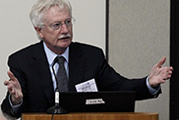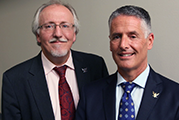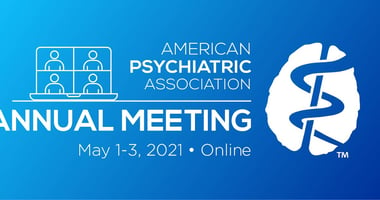Innovative Solutions for Expanding MH Care and More From APA’s 2017 Annual Meeting Day Two
Day two of APA’s Annual Meeting included an announcement of the results of a national poll on Americans’ views on access to mental health care, an address by the director of NIAAA, and discussion about ways to strengthen the therapeutic alliance with a patient after a suicide attempt.
From now through May 24, Psychiatric News will deliver an evening digest of some of the day’s highlights—from the lecture halls to the exhibit floor. Whether you are here in San Diego or at home, these reports will convey the excitement and outstanding scientific program being presented at this year’s meeting.
“We are at the threshold of a wonderful era for psychiatry,” said APA President Maria A. Oquendo, M.D., Ph.D., recapping an eventful presidential year highlighted by her presence at the White House for the signing of the 21st Century Cures Act.
Read More >
During the Opening Session, APA President-elect Anita Everett, M.D., said the development of innovative systems for improving access to care, team-based care for first-episode psychosis, and initiatives regarding physician wellness and burnout would be key goals for her presidency. Read More >
Mental health is important to Americans, and they think it should be important to their elected representatives as well, according to the results of a national poll released today by APA. Read More >
The negative emotional states experienced by people with substance use disorders are an integral part of the addictive process, according to George F. Koob, Ph.D. Read More >
At their meeting held yesterday in conjunction with the Annual Meeting, members of the APA Assembly chose James R. Batterson, M.D., of Kansas City, Mo. (right), as the group’s next speaker-elect. He is the Area 4 representative and is concluding his term as recorder. Steven Daviss, M.D., a representative from the Maryland Psychiatric Society, was elected recorder. The new officers begin their terms at the close of the Annual Meeting, at which time Theresa Miskimen, M.D., of Piscataway, N.J., will become the speaker of the Assembly.
Placing greater emphasis on a patient’s narrative of the feelings leading up to a suicide attempt may not only strengthen the therapeutic alliance, but create a foundation from which safety planning and long-term outreach can be maintained. Read More >
All literature is born from the human need to tell stories that help us understand ourselves and others. Children’s books—which allow young readers to experience love, loss, and betrayal through the lives of characters—can lead to cognitive and emotional growth in young people. Read More >
Physicians today appreciate that chronic pain involves vicious cycles of both physical and psychological feedback. Read More >
Depression and anxiety are, paradoxically, directly linked to the same genetic traits that evolved to help our ancestors survive, said Lee Goldman, M.D., author of Too Much of a Good Thing: How Four Key Survival Traits Are Now Killing Us. Read More >
From now through May 24, Psychiatric News will deliver an evening digest of some of the day’s highlights—from the lecture halls to the exhibit floor. Whether you are here in San Diego or at home, these reports will convey the excitement and outstanding scientific program being presented at this year’s meeting.
Oquendo Recounts Victory of 21st Cures Act, APA’s Ongoing Efforts on AHCA
 |
Read More >
Everett to Center Presidency on Innovative Solutions to Expanding Care, Increasing Support to Members
 |
Large Majority of Americans Say MH Care Should Be Covered by Insurance
 |
NIAAA Director Describes ‘Dark Side of Addiction,’ Hope for Future Treatments
 |
Winners of Assembly Election Announced
 |
Asking Patients About Suicide Narrative May Improve Long-Term Outcomes
 |
What Can Children’s Books Teach You About Your Patients?
 |
Psychiatrists Have Tools Needed to Help Patients in Pain
 |
Historical Survival Traits May Be to Blame for Some Mental Health Disorders
 |





